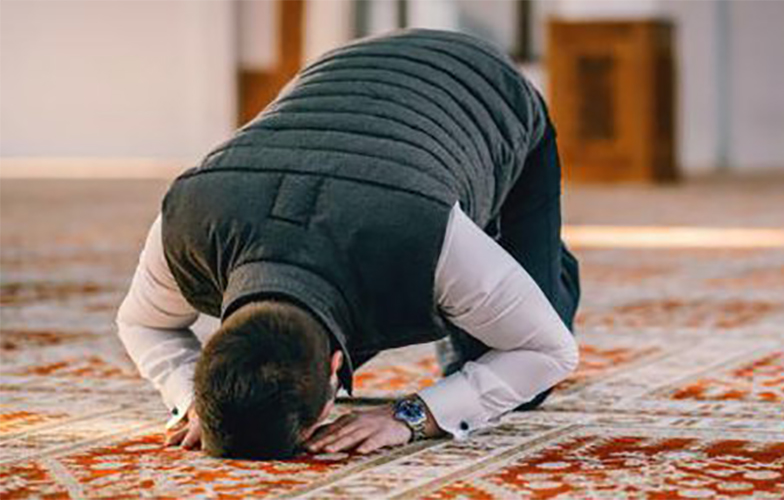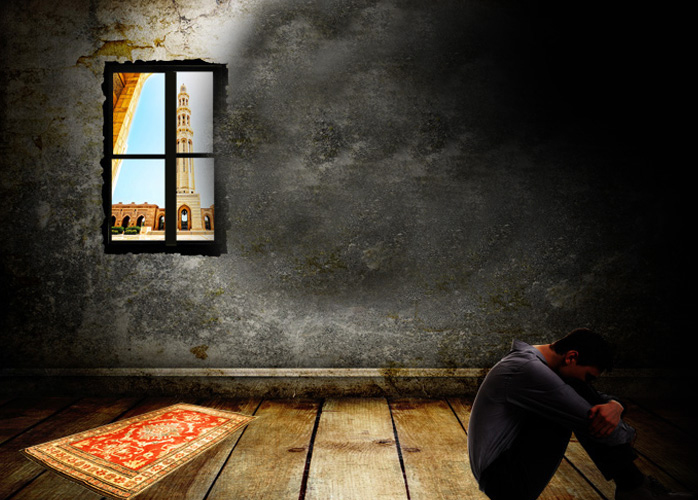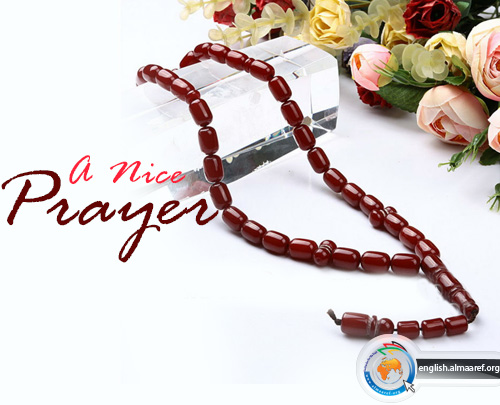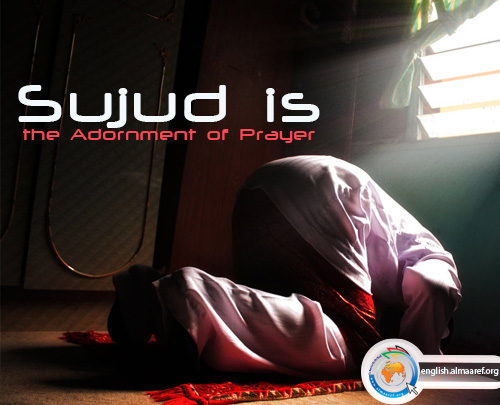The abolishers of the prayer are of two groups:
1- The first group includes those which abolish the prayer whether they happen
intentionally or unintentionally.
2- The second group includes those which abolish the prayer in case they happen
intentionally only.
Group One
The abolishers which abolish the prayer whether they are intentionally or
unintentionally done are:
1- The Great and Little Ritual Impurities: They abolish the prayer even
if they take place at the last letter of peace bestowal.1
2- What Breaks the Form of the Prayer: This includes for instance dancing
and clapping. As regards the simple movements like stirring the fingers,
signaling with the hand, and carrying the child, they do not abolish the prayer.2
3- Adding or Deleting a Basic Element: The prayer is abolished with both
the intentional and unintentional addition and delete of a basic element.
Moreover, to intentionally add or delete a part of the prayer abolishes the
prayer.3
4- Turning: It is meant by this to deviate the body or the face away from
the Qibla. In case the performer of the prayer deviates to the east or to the
west or more, his prayer is abolished.4
Group Two
The abolishers which abolish the prayer when they are intentionally done
only are:
1- Putting One Hand over the Other on the Stomach: In case the performer
of the prayer does this as being from the acts of the prayer, then his prayer is
abolished. On the other hand, in case he does so for a reason rather than its
being one of the acts of the prayer, such as the illness or fixing the clothes,
then it is fine.5
2- Talking: The details of this prayer abolisher are as follows:6
* In case the performer of the prayer utters one meaningless letter from
which he does not intend to make the others understand a specific thing, then it
does not abolish the prayer.
* To intentionally utter two or more letters absolutely abolishes the prayer,
whether they are comprehensible or not.
* In case someone salutes the performer of the prayer, he must reply to the
salutation during the prayer in the same form i.e. Peace be upon you. Still,
take in consideration that:
- The performer of the prayer must be meant by the salutation.7
- The salutation must be in the religious form i.e. Peace be upon you8
[Assalamou Alaykom]; in case it is in another form like “Hi” for instance, then
it is impermissible to reply to it during the prayer.9
- The performer of the prayer must be able to make the one saluting hear the
answer i.e. in case somebody salutes and immediately goes away that the
performer of the prayer can not more make him hear the reply to his salutation,
then he must not, rather is not permitted, to answer.10
- In case the performer of the prayer is in a group, it is a dutiful
cautiousness not to reply in case somebody else is replying even if he doubts
that the salutation is meant to him or not.11
- It is conditional that one replies in a customary immediacy. In case the reply
is for any reason delayed that then the reply of the salutation is no more
applicable, then it is impermissible to reply neither during the prayer nor
outside it.12
3- Guffawing: To guffaw, i.e. to laugh with a sound, abolishes the prayer
even if it is done unintentionally. On the other hand, to smile does not abolish
the prayer.13
4- Crying: It is meant by this to cry with a sound, and this abolishes
the prayer even if done unintentionally. The details related to this are as
follows:14
* What abolishes the prayer is the crying for the loss of a worldly issue, such
as the loss of money.
* The crying for a hereafter issue does not abolish the prayer.
* The crying when asking a worldly issue from The Most High God does not abolish
the prayer especially if the asked for is religiously acceptable. 15
5- Eating and Drinking: Eating and drinking abolish the prayer even if a
little as a dutiful cautiousness. It is fine to swallow the atoms of what is
still remaining in the mouth or between the teeth.16
6- Saying, “Amen” after Al-Fatihah Chapter: Saying, “Amen”, which means
‘O my God! Answer me!’, after Al-Fatihah chapter abolishes the prayer unless it
is said for self protection, then it is fine.17
1- Tahreer Al-Waseela
[Editing the Means] / Part One/ Page 186
2- Tahreer Al-Waseela/ Part One/ Page 189
3- Tahreer Al-Waseela/ Part One/ Page 190
4- Tahreer Al-Waseela/ Part One/ Page 186
5- Tahreer Al-Waseela [Editing the Means] / Part One/ Page 186
6- Tahreer Al-Waseela/ Part One/ Page 186
7- Tahreer Al-Waseela/ Part One/ Page 187/ Question 2
8- Tahreer Al-Waseela/ Part One/ Page 187/ Question 5
9- Ajweebat Al-Istifta’at [The Answers to the Consultations]/ Part One/ Page
145/ Question 501
10- Tahreer Al-Waseela/ Part One/ Page 187/ Question 6
11- Tahreer Al-Waseela/ Part One/ Page 187/ Question 5
12- Tahreer Al-Waseela/ Part One/ Page 187/ Question 7
13- Ajweebat Al-Istifta’at [The Answers to the Consultations] / Part One/ Page
147/ Question 510
14- Tahreer Al-Waseela [Editing the Means] / Part One/ Page 189
15- Tahreer Al-Waseela / Part One/ Page 189
16- Tahreer Al-Waseela / Part One/ Page 189
17- Tahreer Al-Waseela/ Part One/ Page 189




















